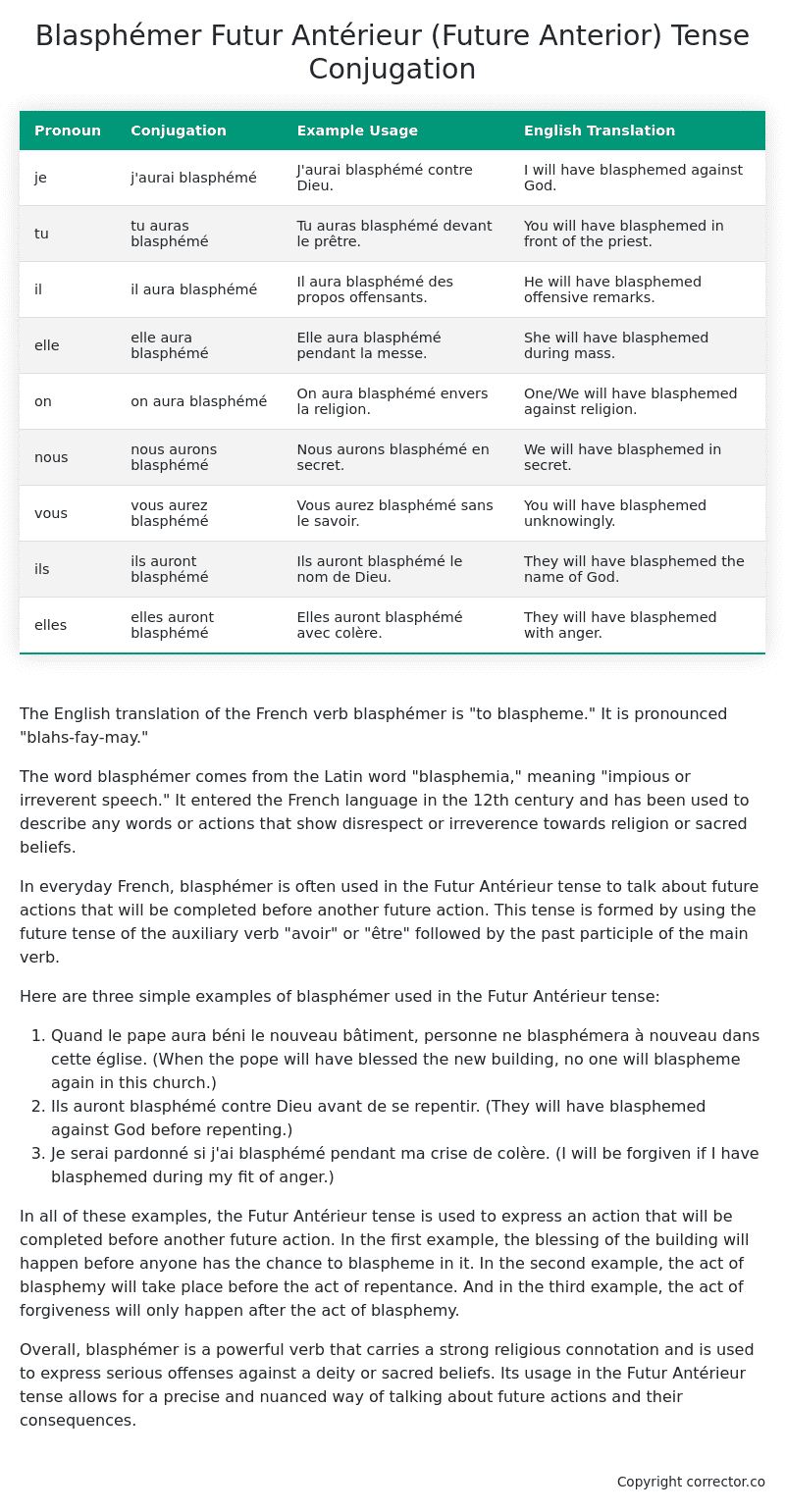Futur Antérieur (Future Anterior) Tense Conjugation of the French Verb blasphémer
Introduction to the verb blasphémer
The English translation of the French verb blasphémer is “to blaspheme.” It is pronounced “blahs-fay-may.”
The word blasphémer comes from the Latin word “blasphemia,” meaning “impious or irreverent speech.” It entered the French language in the 12th century and has been used to describe any words or actions that show disrespect or irreverence towards religion or sacred beliefs.
In everyday French, blasphémer is often used in the Futur Antérieur tense to talk about future actions that will be completed before another future action. This tense is formed by using the future tense of the auxiliary verb “avoir” or “être” followed by the past participle of the main verb.
Here are three simple examples of blasphémer used in the Futur Antérieur tense:
- Quand le pape aura béni le nouveau bâtiment, personne ne blasphémera à nouveau dans cette église. (When the pope will have blessed the new building, no one will blaspheme again in this church.)
- Ils auront blasphémé contre Dieu avant de se repentir. (They will have blasphemed against God before repenting.)
- Je serai pardonné si j’ai blasphémé pendant ma crise de colère. (I will be forgiven if I have blasphemed during my fit of anger.)
In all of these examples, the Futur Antérieur tense is used to express an action that will be completed before another future action. In the first example, the blessing of the building will happen before anyone has the chance to blaspheme in it. In the second example, the act of blasphemy will take place before the act of repentance. And in the third example, the act of forgiveness will only happen after the act of blasphemy.
Overall, blasphémer is a powerful verb that carries a strong religious connotation and is used to express serious offenses against a deity or sacred beliefs. Its usage in the Futur Antérieur tense allows for a precise and nuanced way of talking about future actions and their consequences.
Table of the Futur Antérieur (Future Anterior) Tense Conjugation of blasphémer
| Pronoun | Conjugation | Example Usage | English Translation |
|---|---|---|---|
| je | j’aurai blasphémé | J’aurai blasphémé contre Dieu. | I will have blasphemed against God. |
| tu | tu auras blasphémé | Tu auras blasphémé devant le prêtre. | You will have blasphemed in front of the priest. |
| il | il aura blasphémé | Il aura blasphémé des propos offensants. | He will have blasphemed offensive remarks. |
| elle | elle aura blasphémé | Elle aura blasphémé pendant la messe. | She will have blasphemed during mass. |
| on | on aura blasphémé | On aura blasphémé envers la religion. | One/We will have blasphemed against religion. |
| nous | nous aurons blasphémé | Nous aurons blasphémé en secret. | We will have blasphemed in secret. |
| vous | vous aurez blasphémé | Vous aurez blasphémé sans le savoir. | You will have blasphemed unknowingly. |
| ils | ils auront blasphémé | Ils auront blasphémé le nom de Dieu. | They will have blasphemed the name of God. |
| elles | elles auront blasphémé | Elles auront blasphémé avec colère. | They will have blasphemed with anger. |
Other Conjugations for Blasphémer.
Le Present (Present Tense) Conjugation of the French Verb blasphémer
Imparfait (Imperfect) Tense Conjugation of the French Verb blasphémer
Passé Simple (Simple Past) Tense Conjugation of the French Verb blasphémer
Passé Composé (Present Perfect) Tense Conjugation of the French Verb blasphémer
Futur Simple (Simple Future) Tense Conjugation of the French Verb blasphémer
Futur Proche (Near Future) Tense Conjugation of the French Verb blasphémer
Plus-que-parfait (Pluperfect) Tense Conjugation of the French Verb blasphémer
Passé Antérieur (Past Anterior) Tense Conjugation of the French Verb blasphémer
Futur Antérieur (Future Anterior) Tense Conjugation of the French Verb blasphémer (this article)
Subjonctif Présent (Subjunctive Present) Tense Conjugation of the French Verb blasphémer
Subjonctif Passé (Subjunctive Past) Tense Conjugation of the French Verb blasphémer
Subjonctif Imparfait (Subjunctive Imperfect) Tense Conjugation of the French Verb blasphémer
Subjonctif Plus-que-parfait (Subjunctive Pluperfect) Tense Conjugation of the French Verb blasphémer
Conditionnel Présent (Conditional Present) Tense Conjugation of the French Verb blasphémer
Conditionnel Passé (Conditional Past) Tense Conjugation of the French Verb blasphémer
L’impératif Présent (Imperative Present) Tense Conjugation of the French Verb blasphémer
L’infinitif Présent (Infinitive Present) Tense Conjugation of the French Verb blasphémer
Struggling with French verbs or the language in general? Why not use our free French Grammar Checker – no registration required!
Get a FREE Download Study Sheet of this Conjugation 🔥
Simply right click the image below, click “save image” and get your free reference for the blasphémer Futur Antérieur tense conjugation!

Blasphémer – About the French Futur Antérieur (Future Anterior) Tense
Construction
Common Everyday Usage Patterns
Interactions with Other Tenses
For example
Summary
I hope you enjoyed this article on the verb blasphémer. Still in a learning mood? Check out another TOTALLY random French verb conjugation!


